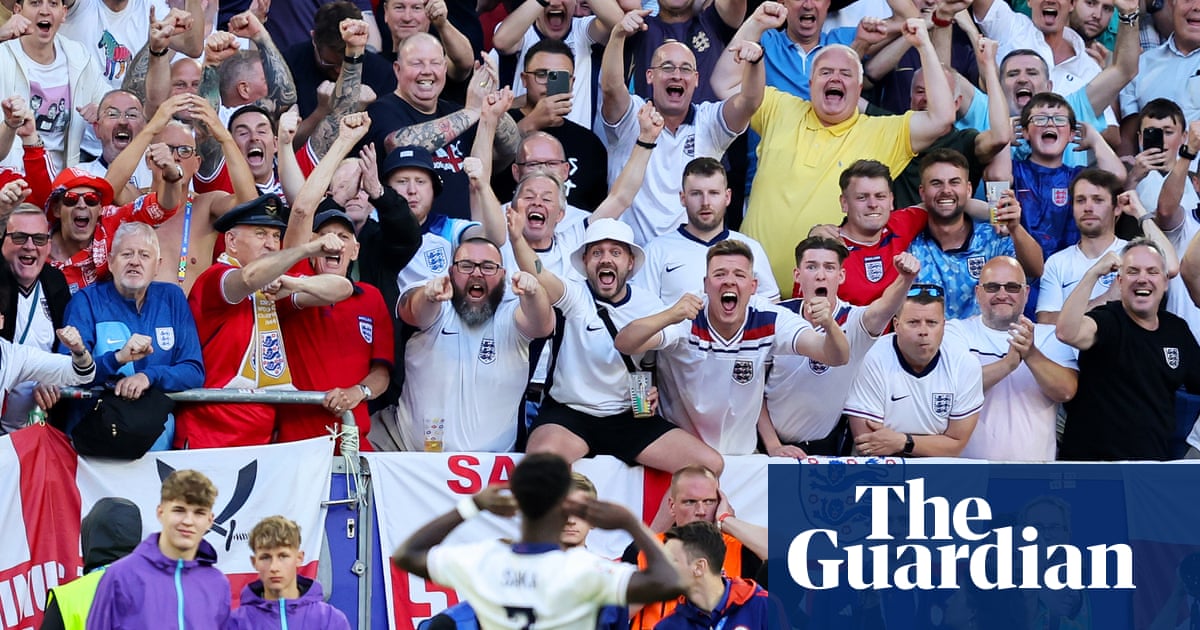
Thomas Concannon, 32, from Newcastle, works for the Football Supporters Association, follows England home and away, and counts Germany as his fifth tournament. He first heard it in Gelsenkirchen before the opening tie against Serbia.
After carrying out a little detective work, Andrew Lawn, author of We Lose Every Week: The History of Football Chanting, reckons it first emerged in the pre-tournament friendlies in June.
What is hardly in doubt is that the England’s musical tribute to the Manchester City midfielder Phil Foden, to the tune of Bruce Springsteen’s Dancing In The Dark, will be sung with extra beery gusto in the Olympiastadion Berlin on Sunday evening and in pubs across the land, as Gareth Southgate’s step out at the European championship final against Spain.
Can’t start a fire,
Can’t start a fire without a spark,
Phil Foden’s on fire,
He’ll be playing the Germans off the park
The song has been difficult to avoid for anyone in the vicinity of a big screen this summer and has, if anything, only enjoyed greater pre-eminence within the English musical back catalogue as the tournament games have notched up.
It has become the fans’ turn-to tune, arguably knocking off David Baddiel and Frank Skinner’s 1996 “Three Lions” from the top of the metaphorical fan charts.
Foden, the Premier League’s best player last season, has actually offered England’s talented team relatively little in the way of spark through the opening group games, the near-death experience against Slovakia in the last 16 and the match against Switzerland.
He was subbed before England beat the Swiss on penalties. “It’s been a bit ironic,” admitted Concannon of the dominance of the Foden chant. But the 24-year-old was described by overjoyed fans as being “on fire” during the game against the Netherlands on Dortmund, in the first half, at least, and the musical tribute is unlikely to die away anytime soon. It raises the question: who is behind it?
A Springsteen rehash about Foden was first heard during Manchester City games in March and shared on fans message boards but Lawn has found a social media posting of the bespoke tournament lyrics, with reference to Germany, being sung at what is likely to have been England’s 1-0 defeat against Iceland in June.
Others think they also heard it the afternoon before the earlier Euro 2024 warm-up game against Bosnia and Herzegovina. Lawn tried to contact those who posted social media clips and there was some reluctance to talk. But, he said, there was actually something quite nice about that.
He said: “One of the things I really love about chants: these songs, just kind of appear from nowhere, and there’s no originator, there’s no creator, there’s no author. It’s just kind of popped into the cultural mind just like that from nowhere. So yeah, I couldn’t find out, but I kind of liked it that I couldn’t.”
That is not always the case. Baddiel and Skinner famously composed “Three Lions” for the Euros in 1996, and Vindaloo was released ahead of 1998 World Cup in France by the band Fat Les. Sir Edward Elgar, the composer of Land of Hope and Glory, wrote one of the first football chants “He Banged The Leather for Goal” in tribute to the Wolves player William Malpass in around 1898.
A more organic type of chant, involving the corrupting of the lyrics of pop songs first emerged, however, in the 1960s as Liverpool fans in Anfield started the habit of singing the hits of the Beatles and Cilla Black, Lawn said.
Lawn added: “There are occasions where someone will post the lyrics to a song on a fan forum or singing it on YouTube, and then it takes off. But I think that happens less and less, because there’s almost like an inauthenticity to that, because it feels like there’s been some kind of craft and some kind of writing process.
“I think most of the ones that are really catchy and long running come from pre game gatherings in pubs and bars. Because what you have in that situation is lots of people together in a crowd where there may be drinks, inhibitions are a bit lower, and you sometimes have music on, that kind of a tune is already in everyone’s head, because it’s playing.
“Someone will just sing some sort of lyrics that fit the tune, that match that moment in time, in terms of the build up to the game or a particular result that’s recent. I think in Britain at least, a lot of it comes down from like mates trying to make their mates laugh”.
Stoke fans have been singing Tom Jones Delilah for 30 years. It started, Lawn said, in a pub before a game against Notts County when a police officer said he didn’t mind the volume but asked some fans in a pub to dial down the profanities.
“One guy stood up on a table in this pub and just started singing Tom Jones’s Delilah at the top of his voice, and the entire pub joined in,” Lawn said. It continued into the stadium, Stoke won, and a three-decade long tradition was borne.
“The key to a good fan’s song is it being simple, catchy and feelgood,” said Lawn. Some, such as the Foden song, also catch a moment. “Foden is absolutely not on fire at the moment and it might be that thing of supporting one of your players when they go through a rough patch,” Lawn said. “I think from when he dyed his hair like Gazza for Euro 2020, he became bit of an English cult hero. Even though he’s never really had his best games in an England shirt, you always feel like something is coming.”












